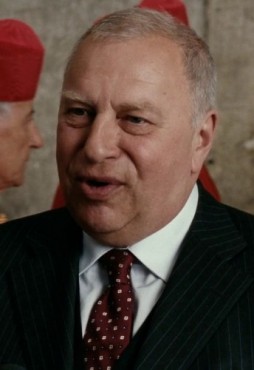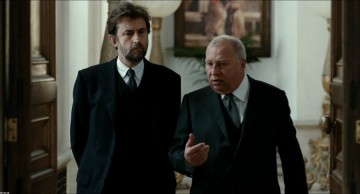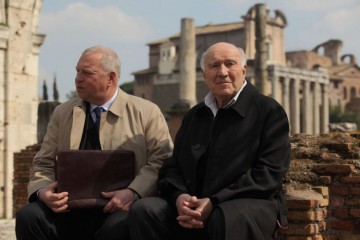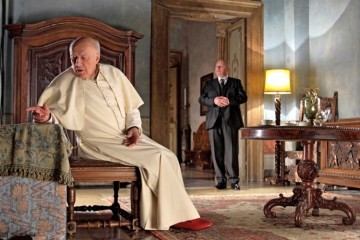STANISŁAW LIGUZIŃSKI: The theme of unpreparedness to face serious responsibilities is a very important part of We Have a Pope, but also your old film Tomorrow’s Weather. The former deals with a political figure — the head of the Catholic Church, while the latter is about a private individual, yet both shrink away from their responsibilities.
JERZY STUHR: I guess when it comes to my generation, there’s just something in the air. I believe that that is somehow our fault. I have a deep sense that we have not groomed successors. I myself feel guilty for not having prepared any of my younger colleagues to properly run a theatre school. And I’m talking about brilliant actors. Take Jan Frycz. He’s a charismatic actor, isn’t he? Of course he is. So is Krzysztof Globisz, but neither of them have any interest in doing it. My generation’s attitude was to take responsibility when the need arose. I’m just talking about this one instance, but you can see my guilt in Tomorrow’s Weather: the feeling that the people coming after us aren’t firmly rooted in society, and, in a sense, aren’t as patriotic. What’s beautiful about We Have a Pope is that the Pope speaks openly about this problem. That’s something I want people to see when the film comes out in Poland. Every press release should drive that point in: this is about someone having the courage to say it. Because the problem is that these people often lack the courage, and end up getting caught up in the endless loop of elections and governments. That’s the problem. But then the main character in Tomorrow’s Weather also admits to having committed a grave error.
Tomorrow’s Weather and We Have a Pope are flip sides of the same situation. In the former, the main character abandons the responsibilities of family life for a religious institution, a monastery. In We Have a Pope, the pontiff admits that most people who seek refuge in the church, himself in particular, should be followers, not leaders.
That’s a beautiful statement, when he says that he should be a follower, not a leader. It’s good to analyse this film from a slightly broader perspective than just the Vatican and the Roman Catholic Church. It is a film about the Vatican, of course, and about a flock suddenly losing its shepherd, but the Vatican is a more universal figure. I don’t know how the film will be received here in the Czech Republic [this interview was conducted at the Karlovy Vary Film Festival – ed.], but the reaction will be different, considering that Catholics aren’t as great of a majority here as they are in Poland.
Czechs will likely see it as more of a satire.
That’s possible. We’ll see. But for me, as a person brought up in the Roman Catholic tradition, one of the most poignant images in the film is when we see the curtains fluttering in the empty balcony of St. Peter’s Basilica, with no Holy Father in sight. The shot is accompanied by silence — the dramatic silence of the crowd. To me that empty window is a sign of something terrible, a symbol that the people have been left without a shepherd. Then there’s a beautiful scene in which the Pope peeks through a tiny window down at the people walking out of the square. It’s such a stirring image! He doesn’t have the courage, meanwhile they are left alone. They put away their flags — the Polish ones too.
Nanni Moretti’s film is full of similar analyses of the spectacular potential contained in church rituals. During the conclave, even the TV reporter isn’t sure what the colour of the smoke coming out of the chimney means, but everyone trembles in anticipation. The ritual remains powerful, but is it losing its meaning?
Yes, people still feel the emotions, but the rituals are stale. Yet all of this is said without an air of malicious lampooning. I appreciate that. Even I tried to tell Moretti to turn it up a notch. I commuted back and forth between Warsaw and Rome during the six months of shooting, and would tell him that back home even Father Obirek was criticising the pope, and that the press was running increasingly acerbic articles about the pontiff. I said, “Nanni, this is even going on in Poland. Can you imagine that? Do you realise how venerated the pope is in Poland? And yet people have been speaking up, debating whether or not the pope knew what was going on, whether he was guilty of a cover-up. It’s started.” He just listened patiently and said, “I don’t think so. I keep my own Vatican inside.” And he made the right choice, although some things were ultimately added to the screenplay. There’s a subtle hint that not only is the pope incapable of fulfilling his role, he’s also afraid because he knows about something that’s beyond his strength.
The pope also says that by accepting the responsibility, he would be required to implement major changes and reform. It struck me how polarised the response to the film was following Cannes. Some critics called it scandalous and accused the movie of striking at the very foundation of the church, while others assumed a more apologetic attitude and wrote about how Moretti was showing the church’s human side. It seems that both are equally unfair to the film. Nanni Moretti talks about the crisis of an institution, but he does so without the use of scandalous plot themes, which would probably draw attention from the actual subject of the film.
Yes, that would detract from the discussion. The movie has left the Italian press strongly polarised. The coverage in all the right wing newspapers and magazines has been increasingly critical, with one Catholic title even recommending against seeing the movie. Meanwhile the left wing press has been giving the film increasingly positive reviews. La Repubblica wrote that Italy hasn’t had a film like this in years. I’m sure Poland will be equally divided over the picture.
I’m curious about the reception in Poland, considering the dramatic final scene in which the pope admits that the conclave had made a mistake in appointing him the head of the church.
Yes, that’s a very secular accent. After all, the conclave cannot make a mistake. Zanussi was the first to confront me about that. I said, “Well, they made the wrong choice,” to which he responded, “What are you talking about? Mr. Stuhr, the cardinals aren’t the ones making the choice.” “Well then who is,” I asked. “The Holy Spirit,” he said. Great.
But such a situation has occurred in history before. Nanni Moretti admitted that he had based the plot on a true story.
Yes. The 13th century Pope Celestine V abdicated the papacy. The poor guy just couldn’t handle it.
He resigned and yet the church didn’t come to an end.
Precisely. To take offense at that part would be to miss the entire point. What matters more is that this scene points out the emptiness of the ritual. After all, Nanni put so much effort into shooting the scenes in authentic locations. Do you know how hard it is to shoot a film in the center of Rome? How do you get those trucks in there? How do you set up the equipment in those narrow streets? It was a complete nightmare.
But part of the film was shot on a sound stage at Cinecitta studios.
Just the Sistine Chapel and the balcony. The balcony is the only part of the film where CGI was used. There was no other way. And the chapel was built at Cinecitta. For every other shot, we pushed our way into the centre of Rome. They won’t let you into the Vatican, but everything was shot in authentic palaces. Palazzo Farnese looks almost like the Vatican.
It was interesting what you said about the church as an institution, since your character represents the institution of the Roman Catholic Church. You’re the pope’s right hand man, keeping everything together in terms of organisation.
Yes, my character is a layman. What’s most interesting is that the pope trusts me more than he does his cardinals. I’m the only one with his cellphone number in my telephone, and he has mine. I’m the only one who can get in touch with him. And that role affects the whole intrigue.
It seems relevant that they cast a Pole for that role. It’s as if it were an expression of the church’s hope for a continuation of the pontifical style of John Paul II. The position of Vatican spokesman stays in the hands of a Pole, who attempts to exert influence on the pope. He compares the pontiff to his predecessor and advises him to act in a similar way.
Yes, and it is in that context that the film’s only direct reference to John Paul II comes up. It is mentioned that he never shied away from his pastoral duties. Nanni made sure to cast a Pole in that role, and he even asked me to come up with a name for him. My accent and appearance just fit the role. And there’s a kernel of truth in it, because there are many Poles working at the Vatican. Father Oder and other officials still work there.
Now that you mention it, there’s an interesting story behind the name of character, Marcin Rajski.
That a was a mistake on my part, because now Poles are starting to over-interpret it. My only intention was to come up with a name that an Italian would have no trouble pronouncing. I needed something short. A name like Szczebrzeszyński would have been a complete tongue twister.
I had mixed feelings about that character. One the one hand, we see that Rajski’s intentions are good, but he does cling to a certain vision of the church, one that he attempts to force onto the newly elected pope. Your character expects the pontifical style of John Paul II to continue, disregarding Cardinal Melville’s doubts.
His goal is to make sure the institution saves face. That’s his position: spokesman. His job at the press conferences and meetings with journalists is to save face at all costs, to sweep anything inconvenient under the rug. It’s actually something of a Polish trait. That’s the responsibility he must bear. In one scene Rajski attempts to share responsibility with the cardinals, saying: “You must realise what has just happened: this is a scandal of global proportions!” And those poor cardinals don’t know what to do…
Going back to your role: the ambivalence of Rajski’s attitude comes out when he plots something resembling a coup by the cardinals against the pope. The clergymen attempt to get the Holy Father out of the theatre. The convention used in this scene, with the crimson clad figures emerging from every door and balcony, is quite terrifying. The pope is besieged in a manner that resembles how Nazis would be portrayed capturing some important Jew.
You are absolutely correct. He is practically left with no choice in that situation. But it’s good that that isn’t said outright. My character holds one last press conference at which he admits his mistake and announces that he knows the whereabouts of the pope. It’s a layering of theatre upon theatre, and if you add to that Chekhov’s The Seagull, the play being performed on stage at the theatre, then everything falls neatly into place. There’s Nina, a failed actress who keeps trying to launch her career, but just can’t get satisfaction. The intersection between these two plot lines was very meticulously thought-out. I just hope audiences will pick up on that, instead of just moaning about how the movie attacks the church…
translated by Arthur Barys











